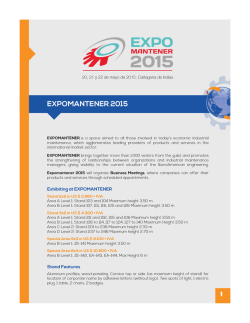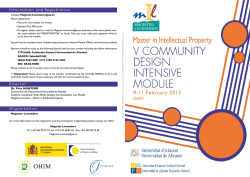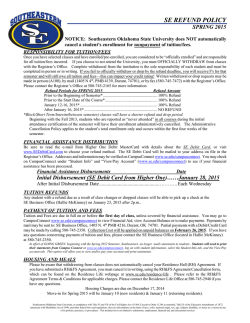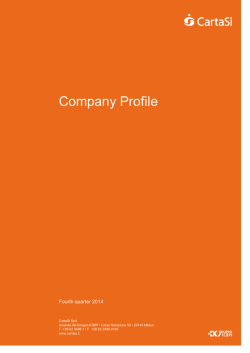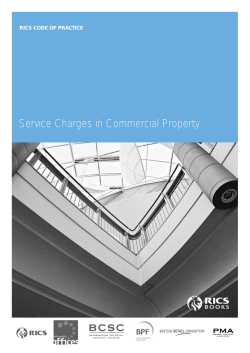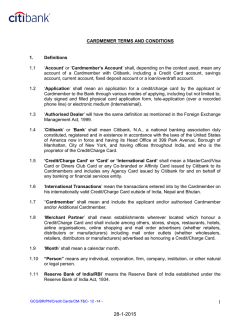
GUIDELINES FOR EXAMINATION IN THE OFFICE - OHIM
Payment of Fees, Costs and Charges GUIDELINES FOR EXAMINATION IN THE OFFICE FOR HARMONIZATION IN THE INTERNAL MARKET (TRADE MARKS AND DESIGNS) ON COMMUNITY TRADE MARKS PART A GENERAL RULES SECTION 3 PAYMENT OF FEES, COSTS AND CHARGES Guidelines for Examination in the Office, Part A, General Rules DRAFT VERSION 1.0 Page 1 01/02/2015 Payment of Fees, Costs and Charges Table of Contents 1 Introduction ................................................................................................ 3 2 Means of Payment ..................................................................................... 4 2.1 Payment by bank transfer .......................................................................... 4 2.1.1 2.1.2 Bank account .................................................................................................. 4 Details which must accompany the payment ................................................. 5 2.2 Payment by debit or credit card ................................................................ 7 2.3 Payment by OHIM current account ........................................................... 7 3 Time of Payment ........................................................................................ 9 4 Date on which Payment is Deemed to be Made ...................................... 9 4.1 Payment by bank transfer .......................................................................... 9 4.1.1 4.1.2 5 6 Late payment with or without surcharge ......................................................... 9 Evidence of payment and of the date of payment ........................................ 10 4.2 Payment by debit or credit card .............................................................. 11 4.3 Payment by current account ................................................................... 11 Refund of Fees ......................................................................................... 12 5.1 Refund of application fee ......................................................................... 12 5.2 Refund of the opposition fee ................................................................... 13 5.3 Refund of fees for international marks designating the EU .................. 13 5.4 Refund of appeal fees .............................................................................. 13 5.5 Refund of renewal fees ............................................................................ 13 5.6 Refund of insignificant amounts ............................................................. 14 Decisions on Costs ................................................................................. 14 6.1 Apportionment of costs ........................................................................... 14 6.2 Fixing of costs .......................................................................................... 14 6.3. Enforcement of the decision on costs ...................................................... 15 6.3.1 6.3.2 6.3.3 Conditions ..................................................................................................... 15 National authority .......................................................................................... 15 Proceedings .................................................................................................. 15 Guidelines for Examination in the Office, Part A, General Rules DRAFT VERSION 1.0 Page 2 01/02/2015 Payment of Fees, Costs and Charges 1 Introduction For CTMs, in addition to the provisions contained in the basic CTMR and in the CTMIR, there is a specific regulation on the fees payable to OHIM (CTMFR). This regulation was amended once in 2004, twice in 2005 and once in 2009. An unofficial consolidated text of the CTMFR, including references to the codified CTMR, is available online. The full list of fees can be found on the OHIM website. Similarly, for RCDs, in addition to the provisions contained in the basic CDR and in the CDIR, there is a specific regulation on the fees payable to OHIM (CDFR). This regulation was amended in 2007 following the accession of the European Union to the Geneva Act of the Hague Agreement concerning the international registration of industrial designs (CDFR). Finally, the President of the Office is empowered to lay down charges which may be payable to the Office for services it may render and to authorise methods of payments in addition to those explicitly provided for in the CTMFR and the CDFR. The differences between fees, costs and charges are as follows. Fees must be paid to the Office by the users for the filing and handling of trade marks and designs proceedings; the fees regulations determine the amounts of the fees and the ways in which they must be paid. Most of the proceedings before the Office are subject to the payment of fees, such as the application fee for a CTM or an RCD, a renewal fee, etc. Some fees have been reduced to zero (e.g. registration fees for CTMs, transfers for CTMs). The amounts of the fees have to be fixed at such a level as to ensure that the revenue is in principle sufficient for the budget of the Office to be balanced (see Article 144 CTMR) in order to guarantee the full autonomy and independence of the Office. The revenue of the Office comes principally from fees paid by the users of the system (see 18th Recital CTMR). Costs refer to the costs of the parties in inter partes proceedings before the Office in particular for professional representation (for trade marks see Article 85 CTMR and Rule 94 CTMIR, for designs see Articles 70-71 CDR and Article 79 CDIR). Decisions in inter partes cases must contain a decision on fees and costs of the professional representative and must fix the amount. The decision on costs may be enforced once the decision has become final, pursuant to Article 86 CTMR. Charges are fixed by the President of the Office for any services rendered by the Office other than those specified in Article 2 CTMFR (see Rule 87(2) CTMIR and Article 3(1) and (2) CTMFR). The amounts of the charges laid down by the President will be published in the Official Journal of the Office and can be found on the website under decisions of the President. Examples are the charges for mediation in Brussels or for certain publications issued by the Office. Guidelines for Examination in the Office, Part A, General Rules DRAFT VERSION 1.0 Page 3 01/02/2015 Payment of Fees, Costs and Charges 2 Means of Payment Article 5 CTMFR Article 5 CDFR Communication No 2/97 of the President of the Office of 03/07/1997 All fees and charges must be paid in euros. Payments in other currencies are not valid, do not create rights and will be reimbursed. Fees payable to the Office may not be paid to or via national Offices. The admissible means of payment are, in most cases, bank transfers, debits from the current accounts held at the Office, and (for certain on-line services only) debit or credit cards. Cash payments at the Office’s premises and cheques are no longer accepted (decision of 03/09/2008, R 524/2008-1 – ‘TEAMSTAR’). The Office cannot issue invoices. However, the Office will provide a receipt when requested to do so by the user. 2.1 Payment by bank transfer Money may be sent to the Office by means of transfer. A fee is not deemed to be paid if the order to transfer is given after the end of the time limit. If the fee is sent before the time limit but arrives after its expiry, under specific conditions the Office may consider the fee has been duly paid (see paragraph 4.1 below). 2.1.1 Bank account Payment by bank transfer can only be made to one of the following two bank accounts of the Office: Bank Banco Bilbao Vizcaya Argentaria La Caixa Address Explanada de España, 11 E-03002 Alicante SPAIN Calle Capitán Segarra, 6 E-03004 Alicante SPAIN Swift code* BBVAESMMXXX CAIXESBBXXX IBAN ES8801825596900092222222 ES0321002353010700000888 Bank charges** >OUR >OUR * Swift code: Some computer programs do not accept the last three digits XXX of the Swift/BIC code. Should this be the case, users must indicate BBVAESMM or CAIXESBB. ** Bank charges: It is important to make sure that the entire amount reaches the Office, without any deductions. Therefore, in the case of a transfer ‘OUR’ must be indicated as the method of payment for the bank charges in order to allow full reception by the Office of the amount due. However, for SEPA payments, the default SEPA Guidelines for Examination in the Office, Part A, General Rules DRAFT VERSION 1.0 Page 4 01/02/2015 Payment of Fees, Costs and Charges specification ‘SHA’ is required. SEPA is a common European payments system, used by most banks in all EU Member States and five additional European countries. 2.1.2 Details which must accompany the payment Article 7 CTMFR Article 6 CDFR The payment of a fee and indication of the nature of the fee and the procedure to which it refers does not substitute the other remaining formal requirements of the procedural act concerned. For example, the payment of the appeal fee and the indication of the number of the contested decision is not sufficient for filing a valid notice of appeal (judgment of 31/05/2005, T-373/03, ‘PARMITALIA’, para. 58; judgment of 09/09/2010, T--70/08 ‘ETRAX’, para. 23-25). When the information supplied is insufficient to properly enable the allocation of the payment, the Office will specify a time limit within which the missing information must be provided, failing which the payment will be considered not to have been made and the sum will be reimbursed. OHIM receives thousands of payments a day and the incorrect or insufficient identification of the dossier can lead to considerable delays in processing procedural acts. The following data must be included in the transfer form with the payment: CTM/RCD number Payer name and address or Office ID number Nature of the fee, preferably in its abbreviated form. In order to deal with payments swiftly with regards to bank transfers, and bearing in mind that only a limited number of characters may be used in the ‘sender’ and ‘description’ fields, filling in these fields as follows is highly recommended. DESCRIPTION FIELD Use the codes listed in the tables below, for example: CTM instead of: APPLICATION FEE FOR A COMMUNITY TRADE MARK. Remove initial zeroes in numbers and do not use spaces or dashes since they use up space unnecessarily. Always start with the CTM or RCD number, e.g. CTM3558961. If the payment is for more than one trade mark or design, only specify the first and last one, e.g. CTM3558961-3558969, and then send a fax with the full details of the trade marks or designs concerned. Description Codes Description Code Example Payment to current account CC + account number If the owner or the representative has an ID number OWN + ID number, REP + ID REP10711 number Number of the trade mark or the design CTM, RCD + number Guidelines for Examination in the Office, Part A, General Rules DRAFT VERSION 1.0 CC1361 CTM5104422 RCD1698 Page 5 01/02/2015 Payment of Fees, Costs and Charges ‘XYZABC’ or ‘bottle shape’ A short nickname of the CTM or RCD Operation code: Application fee for CTM or RCD International application fee Renewal fee Opposition fee Cancellation fee Appeal Recordal Transfer Conversion Inspection of files Certified Copies CTM, RCD INT RENEW OPP CANC APP REC TRANSF CONV INSP COPIES OPP, REC, RENEW, INSP, INT, TRANSF, CANC, CONV, COPIES, APP Examples: Payment Object Example of Payment Description Application fee (CTM = Community Trade Mark) CTM5104422 XYZABC. Application fee (RCD = Registered Community Design) RCD1234567 bottle shape. Opposition + payer CTM4325047 OPP XYZABCREP10711 International application CTM4325047 INT XYZABC Renewal (CTM) CTM509936 RENEW Payment to current account No 1361 CC1361 Certified Copies CTM1820061 COPIES Transfer of multiple designs (first 1420061 and last 1420065) + payer RCD1420061-1420065 TRANSF REP10711 Recordal of a licence for a CTM CTM4325047 REC LICENCE OWN10711 SENDER FIELD Examples for address Address Payer name Payer address Payer city and post code Example John Smith 58 Long Drive London, ED5 6V8. Use a name that can be identified as a payer, applicant (owner or representative) or opponent. For the payer name, use only the name, without abbreviations like DIPL.-ING. PHYS., DR., etc. Use the same form of identification for future payments. Guidelines for Examination in the Office, Part A, General Rules DRAFT VERSION 1.0 Page 6 01/02/2015 Payment of Fees, Costs and Charges 2.2 Payment by debit or credit card Decision No EX-13-2 of the President of the Office of 26/11/2013 concerning electronic communication with and by the Office: Article 7, Electronic payment of fees by credit card Article 2(1)(b) to Article 2(4) and Article 2(12) to (15) CTMFR and Article 5(2) CDFR Payment by debit or credit card is not yet available for all OHIM fees. Only certain online services can be paid by debit or credit card. The following debit or credit cards may be used: Visa, Mastercard and Discover. For electronically filed applications and renewals, payment by debit or credit card is the recommended method. Debit or credit card payments allow OHIM to make the best use of its own automatic internal systems, so that work can start on the file more quickly. Debit or credit card payments are immediate (see paragraph 4.2 below) and are not, therefore, allowed for delayed payments (within one month from the filing date). For all other fees, the use of debit or credit cards is not currently available. In particular, debit or credit cards cannot be used to pay charges referred to in Article 3 CTMFR and Article 3 CDFR or to top up a current account. Debit or credit card payments require some essential information. The information disclosed will not be stored by OHIM in any permanent database. It will only be kept until it is sent to the bank. Any record of the form will only include the debit or credit card type (VISA, MasterCard or Discover) plus the last four digits of the debit or credit card number. The entire debit or credit card number can safely be entered via a secure server, which encrypts all information submitted. 2.3 Payment by OHIM current account Decision No Ex-96-1 of the President of the Office of 11/01/1996 concerning the conditions for opening current accounts at the Office as amended in 1996, 2003 and 2006 Communication No 5/01 of the President of the Office of 29/06/2001 concerning the availability of current accounts statements on the Office internet site Communication No 11/02 of the President of the Office of 11/10/2002 concerning the opening of another bank account It is advisable to open a current account at the OHIM since for any request which is subject to time limits, such as filing oppositions or appeals, the payment will be deemed to have been made on time even if the relevant documentation in relation to which the payment was made (for instance a notice of opposition) is filed on the last day of the deadline, provided that the current account has sufficient funds (see paragraph 4.3 below) (decision of 07/09/2012, R 2596/2011-3 ‘STAIR GATES’, paras 13-14). The date on which the current account is actually debited will usually be later, but payment will be deemed to have been made on the date on which the request for a procedural act is received by the Office, or as otherwise convenient for the party to the proceedings, in accordance with Article 6 of Decision No Ex-96-1 of the President of the Office as amended in 2006. Guidelines for Examination in the Office, Part A, General Rules DRAFT VERSION 1.0 Page 7 01/02/2015 Payment of Fees, Costs and Charges If the person (either party to the proceedings or their representative) who has filed the application or the respective procedural act is the holder of a current account with the Office, the Office will automatically debit the current account, unless instructions to the contrary are given in any individual case. In order for the account to be correctly identified, the Office recommends clearly indicating the OHIM ID number of the holder of the current account with the Office. The system of current accounts is an automatic debiting system meaning that upon identification of such an account, the Office may debit, according to the development of the procedures concerned and insofar as there are sufficient funds in the account, all fees and charges due within the limits of the aforementioned procedures, and a payment date will be accorded each time without any further instructions. The only exception to this rule is made when the holder of a current account who wishes to exclude the use of their current account for a particular fee or charge informs the Office thereof in writing. In this scenario, however, the owner of the account may change the method of payment back to payment by current account at any time before the expiry of the payment deadline. The absence of an indication or incorrect indication of the amount of the fee does not have any negative effect since the current account will be automatically debited with reference to the corresponding procedural act for which the payment is due. If there are insufficient funds in a current account, the holder will be notified by the Office and given the possibility to replenish the account and to pay 20% to cover administrative charges due to lack of funds. If the holder does so, the payment of the fee will be deemed to have been received on the date the relevant document in relation to which the payment was made (for instance a notice of opposition) is received by the Office. If payment concerns the replenishment of a current account, it is sufficient to indicate the current account number. If the account is replenished, the holder should ensure that sufficient funds are provided for all payments due or at least indicate the priorities for which the money should be used (decision of 03/09/2008, R 1350/2007-1 – ‘SCHNEIDER’). Where no priorities are indicated, the Office will cover the payments in the chronological order in which they fall due. OHIM provides current account holders with access to their current account information over a secure internet connection for at least the previous year via its website. The service includes the account balance, list of all transactions, monthly statements and a search tool to find specific transactions. Payment of a fee by debiting a current account held by a third party requires an explicit written authorisation. Payment is considered to be effected on the date the Office receives the authorisation. The authorisation must be given by the holder of the current account and must state that their account can be debited for a specific fee. If the holder is neither the party nor their representative, the Office will check if there is such an authorisation. If there is not, the Office will invite the party concerned to submit the authorisation to debit the third party’s account before the time limit for payment expires, where this is appropriate under the circumstances. The party requesting the payment of a fee by debiting a third party’s current account must submit the authorisation to the Office in order to allow the account to be debited. A current account can be opened at the OHIM by sending a request to the general fax No: +34-965.131.344 or E-mail: [email protected] Guidelines for Examination in the Office, Part A, General Rules DRAFT VERSION 1.0 Page 8 01/02/2015 Payment of Fees, Costs and Charges The minimum amount required to open a current account is EUR 3 000. 3 Time of Payment Article 4 CTMFR Article 4 CDFR Fees must be paid by the date on which they become due. If a time limit is specified for a payment to be made, that payment must be made within that time limit. Fees and charges for which the regulations do not specify a due date will be due on the date of receipt of the request for the service for which the fee or the charge is incurred, for example, a recordal application. 4 Date on which Payment is Deemed to be Made Article 8(1), 8(3) CTMFR Article 7 CDFR Article 7 of Decision No Ex-96-1 of the President of the Office of 11/01/1996 concerning the conditions for opening current accounts at the Office as amended in 1996, 2003 and 2006 Decision No EX-13-2 of the President of the Office of 26/11/2013 concerning electronic communication with and by the Office: Article 7, Electronic payment of fees by credit card The date on which a payment is deemed to be made will depend on the method of payment. 4.1 Payment by bank transfer When the payment is made by transfer or payment to an Office bank account, the date on which payment is deemed to have been made is the date on which the amount is credited to the Office bank account. 4.1.1 Late payment with or without surcharge A payment that is received by the Office after the expiry of the time limit will be considered to have been made in due time if evidence is provided to the Office that the person who made the payment, (a) ) duly gave an order, in a Member State and within the relevant period for payment, to a banking establishment to transfer the amount of the payment, and (b) paid a surcharge of ten per cent of the total amount due (up to a maximum amount of EUR 200). (Both conditions must be fulfilled in accordance with judgment of 12/05/2011, T-488/09, ‘Redtube I’, para. 38, and decision of 10/10/2006, R 203/2005-1 ‘Blue Cross’.) Guidelines for Examination in the Office, Part A, General Rules DRAFT VERSION 1.0 Page 9 01/02/2015 Payment of Fees, Costs and Charges The same is not true for the late payment of the surcharge. If the surcharge is late, the entire payment is late and cannot be remedied by the payment of a ‘surcharge of the surcharge’ (decision of 07/09/2012, R 1774/2011-1 'LAGUIOLE', paras 12-15). The surcharge will not be due if the person submits proof that the payment was initiated more than ten days before the expiry of the relevant time limit. The Office may set a time limit for the person who made the payment after the expiry of the time limit to submit evidence that one of the above conditions was fulfilled. For more information on the consequences of late payment in particular proceedings, see the relevant parts of the Guidelines. For example, Part B, Section 2, Formalities deals with the consequences of late payment of the application fee while Part C, Section 1, Procedural matters deals with the consequences of late payment of the opposition fee. 4.1.2 Evidence of payment and of the date of payment Article 76 CTMR Article 8(4) CTMFR Article 63 CDR Article 7(4) CDFR Any means of evidence may be submitted, such as: a bank transfer order (e.g. SWIFT order) containing stamps and date of receipt by the bank involved; an online payment order sent via the internet or a print out of an electronic transfer provided it contains information on the date of the transfer, on the bank it was sent to, and an indication like ‘transfer done’. In addition, the following evidence may be submitted: acknowledgement of receipt of payment instructions by the bank; letters from the bank where the payment was effected, certifying the day on which the order was placed or the payment was made, indicating the proceeding for which it was made; statements from the party or their representative in writing, sworn or affirmed or having a similar effect under the law of the State in which the statement is drawn up. Such additional evidence is only considered sufficient if supported by the initial evidence. This list is not exhaustive. If the evidence is not clear, the Office will send a request for further evidence. If no evidence is submitted, the proceeding for which the payment was made is deemed not to have been entered. Guidelines for Examination in the Office, Part A, General Rules Page 10 DRAFT 01/02/2015 VERSION 1.0 Payment of Fees, Costs and Charges In the event of insufficient proof, or if the payer fails to comply with the Office’s request for the missing information, the latter will consider that the time limit for payment has not been observed. The Office may likewise, within the same time limit, request the person to pay the surcharge. In the event of non-payment of the surcharge, the deadline for payment will be considered not to have been observed. The fee or charges or the part thereof that have been paid will be reimbursed since the payment is invalid. Rule 96(2) CTMIR Article 81(2) CDIR Language of the evidence: the documents may be filed in any official language of the EU. Where the language of the documents is not the language of the proceedings, the Office may require that a translation be supplied in any language of the Office. 4.2 Payment by debit or credit card Payment by debit or credit card is deemed to be made on the date on which the successful electronic filing it refers to is submitted via the internet. 4.3 Payment by current account Decision No Ex-96-1 of the President of the Office of 11/01/1996 concerning the conditions for opening current accounts at the Office as amended in 1996, 2003 and 2006 If the payment is made through a current account held with the Office, Decision No EX-96-1 of the President, as amended, ensures that the date on which the payment is deemed to be made is fixed in order to be convenient for the party to the proceedings. For example, for the application fee of a CTM, as a rule, the fees will be debited from the current account on the last day of the one-month time limit given to pay the fee. However the applicant/representative may instruct the Office to debit their account upon receipt of the CTM application. Likewise, upon renewal, the account holder may choose ‘Debit now’ or ‘Debit on expiry’. If a party withdraws its action (opposition, cancellation request, appeal, renewal application) before the end of the time limit to make the payment, fees due to be debited on expiry of the time limit to pay the fee will not be debited from the current account and the action will be deemed not to have been filed. Guidelines for Examination in the Office, Part A, General Rules Page 11 DRAFT 01/02/2015 VERSION 1.0 Payment of Fees, Costs and Charges 5 Refund of Fees Article 7(2) and Articles 9 and 13 CTMFR Articles 84, 154 and 156 CTMR Articles 6(2) and 8(1) CDR Article 30(2) CDIR The refund of fees is explicitly foreseen in the regulations. Refunds are given by means of bank transfers or through current accounts with OHIM even when the fees were paid by debit or credit card. 5.1 Refund of application fee Rule 9(1) and (2) CTMIR Articles 10, 13 and 22 CDIR Article 44(6) CTMR In the event of the withdrawal of a CTM application, fees are not refunded except if a declaration of withdrawal reaches the Office: where payment has been made by bank transfer, before the date on which the amount is actually entered in the bank account of the Office; where payment has been made by debit or credit card, on the same day as the application containing the debit or credit card instructions/details; where payment is made by current account, within the one-month time limit for paying the basic application fee or, where written instruction has been given to immediately debit the current account, before or at the latest on the same day on which that instruction was received. Where the basic application fee has to be refunded, any additional class fees paid will be refunded as well. The Office will only refund additional class fees on their own where they have been paid in excess of the classes indicated by the applicant in the CTM application and where such payment was not requested by the Office or where, upon examination of the classification, the Office concludes that additional classes have been included that were not required in order to cover the goods and services contained within the original application. As regards designs, if there are deficiencies which affect the filing date, that is, the filing date is not granted due to those deficiencies, and that are not remedied by the time limit granted by the Office, the design(s) will not be dealt with as a Community design and any fees paid will be refunded. On the contrary, under no circumstances will the fees be refunded if the design applied for has been registered. Guidelines for Examination in the Office, Part A, General Rules Page 12 DRAFT 01/02/2015 VERSION 1.0 Payment of Fees, Costs and Charges 5.2 Refund of the opposition fee Rules 17(1), 18(5) and 19(1) CTMIR If an opposition is deemed not entered (because it was filed after the three-month time limit) or if the opposition fee was not paid in full or was paid after the expiry of the opposition period, the Office must refund the fee, including the surcharge. 5.3 Refund of fees for international marks designating the EU Decision No ADM-11-98 of the President of the Office related to regularisation of certain reimbursement of fees See the Manual, Part M, International Marks, paragraph 3.13. 5.4 Refund of appeal fees Provisions regarding the refund of appeal fees are dealt with under Rule 51 CTMIR and Article 35(3) and Article 37 CDIR. 5.5 Refund of renewal fees Rule 30(6) and (7) CTMIR Fees which are paid before the start of the first six-month time limit for renewal will not be taken into consideration and will be refunded. Where the fees have been paid, but the registration is not renewed (i.e. where the fee has been paid only after the expiry of the additional time limit, or where the fee paid amounts to less than the basic fee and the fee for late payment/late submission of the request for renewal, or where certain other deficiencies have not been remedied), the fees will be refunded. Where the owner has instructed the Office to renew the mark, and subsequently either totally or partially (in relation to some classes) withdraws their instruction to renew, the renewal fee, if already debited, will only be refunded: if, in the case of payment by bank transfer, the Office received the withdrawal before receiving the payment; if, in the case of payment by debit or credit card, the Office received the withdrawal before or on the same day as receiving the debit or credit card payment; if, in the case of payment by current account, the Office received the withdrawal within the six-month time limit for renewal or, where written instruction was given to debit the current account immediately, before or at the latest on the same day that the Office received the instruction. Guidelines for Examination in the Office, Part A, General Rules Page 13 DRAFT 01/02/2015 VERSION 1.0 Payment of Fees, Costs and Charges For further information, see the Guidelines, Part E, Register Operations, Section 4, Renewal. 5.6 Refund of insignificant amounts Article 10(1) CTMFR Article 9(1) CDFR Decision No EX-03-6 of the President of the Office of 20/01/2003 determining the insignificant amount of fees and charges A fee will not be considered settled until it has been paid in full. If this is not the case, the amount already paid will be reimbursed after the expiry of the time limit allowed for payment, since in this case the fee no longer has any purpose. However, insofar as it is possible, the Office may invite the person to complete payment within the time limit. Where an excess sum is paid to cover a fee or a charge, the excess will not be refunded if the amount is insignificant and the party concerned has not expressly requested a refund. Insignificant amounts are fixed at EUR 15 by Decision No EX-03-6 of the President of the Office of 20/01/2003. 6 Decisions on Costs Article 85 CTMR Rule 94 CTMIR 6.1 Apportionment of costs In inter partes proceedings, the Opposition Division, the Cancellation Division and the Boards of Appeal must take a decision on the apportionment of costs. Those costs include in particular the costs of the professional representative, if any, and the corresponding fees. For further information relating to the apportionment of costs in opposition proceedings, see the Guidelines, Part C, Opposition, Part 1: Procedural Matters. Where the decision contains obvious mistakes as regards the costs, the parties may ask for a corrigendum (Rule 53 CTMIR) or a revocation (Article 80 CTMR), depending on the circumstances (see Part A, Section 6, Revocation of decisions, cancellation of entries in the register and correction of errors). 6.2 Fixing of costs The decision fixing the amount of costs includes the lump sum provided in Rule 94 CTMIR for professional representation and fees (see above) incurred by the winning party, independently of whether they have actually been incurred. The fixing of the costs may be reviewed in a specific proceeding pursuant to Article 85(6) CTMR. Guidelines for Examination in the Office, Part A, General Rules Page 14 DRAFT 01/02/2015 VERSION 1.0 Payment of Fees, Costs and Charges 6.3. Enforcement of the decision on costs Article 86 CTMR The Office is not competent for enforcement procedures. These must be carried out by the competent national authorities. 6.3.1 Conditions The winning party may enforce the decision on costs, provided that: 6.3.2 the decision contains a decision fixing the costs in their favour; the decision has become final; the party may give evidence that the decision became final by submitting appropriate extracts from the Office’s databases or individual confirmation by the Office; the decision bears the order of the competent national authority. National authority Each Member State will designate a national authority for the purpose of appending the order for the enforcement of Office decisions fixing the costs. The Member State will make the designation known to the Office and to the Court of Justice (Article 86(2) CTMR). The Office publishes such designations in its Official Journal. References can be found for: Austria (OJ OHIM 4/2004, p. 559 and 561) Belgium (OJ OHIM 4/2007) Czech Republic (pending publication) Denmark (OJ OHIM 10/2002, p. 1883) Estonia (OJ OHIM 10/2009) France (OJ OHIM 5/2002, p. 886) Germany (OJ OHIM 6/2005, p. 853 and 855) Ireland (OJ OHIM 3/2007) The Netherlands (OJ OHIM 12/1999, p. 1517) Slovakia (OJOHIM 11/2004, p. 1273) the United Kingdom OJ OHIM 12/1998, p. 1381) Certain other Member States have assigned jurisdiction to a national authority (e.g., in the case of Spain, to the General Technical Bureau of the Ministry of Justice as per Royal Decree 1523/1997) but have not yet notified OHIM or the CJEU. 6.3.3 a. Proceedings The interested party must request the competent national authority to append the enforcement order to the decision. For the time being, the conditions on languages of the requests, translations of the relevant parts of the decision, fees and the need of a representative depend on the practice of the Member States and are not harmonised but are considered on a case-by-case basis. Guidelines for Examination in the Office, Part A, General Rules Page 15 DRAFT 01/02/2015 VERSION 1.0 Payment of Fees, Costs and Charges The competent authority will append the order to the decision without any other formality beyond the verification of the authenticity of the decision. As to wrong decisions on costs or fixing of costs, see paragraphs 6.1 and 6.2 above. b. If the formalities have been completed, the party concerned may proceed to enforcement. Enforcement is governed by the rules of civil procedure in force in the territory where it is carried out. The enforcement may be suspended only by a decision of the Court of Justice of the European Union. However, the courts of the country concerned have jurisdiction over complaints that enforcement is being carried out in an irregular manner (Article 86(4) CTMR). Guidelines for Examination in the Office, Part A, General Rules Page 16 DRAFT 01/02/2015 VERSION 1.0
© Copyright 2026


